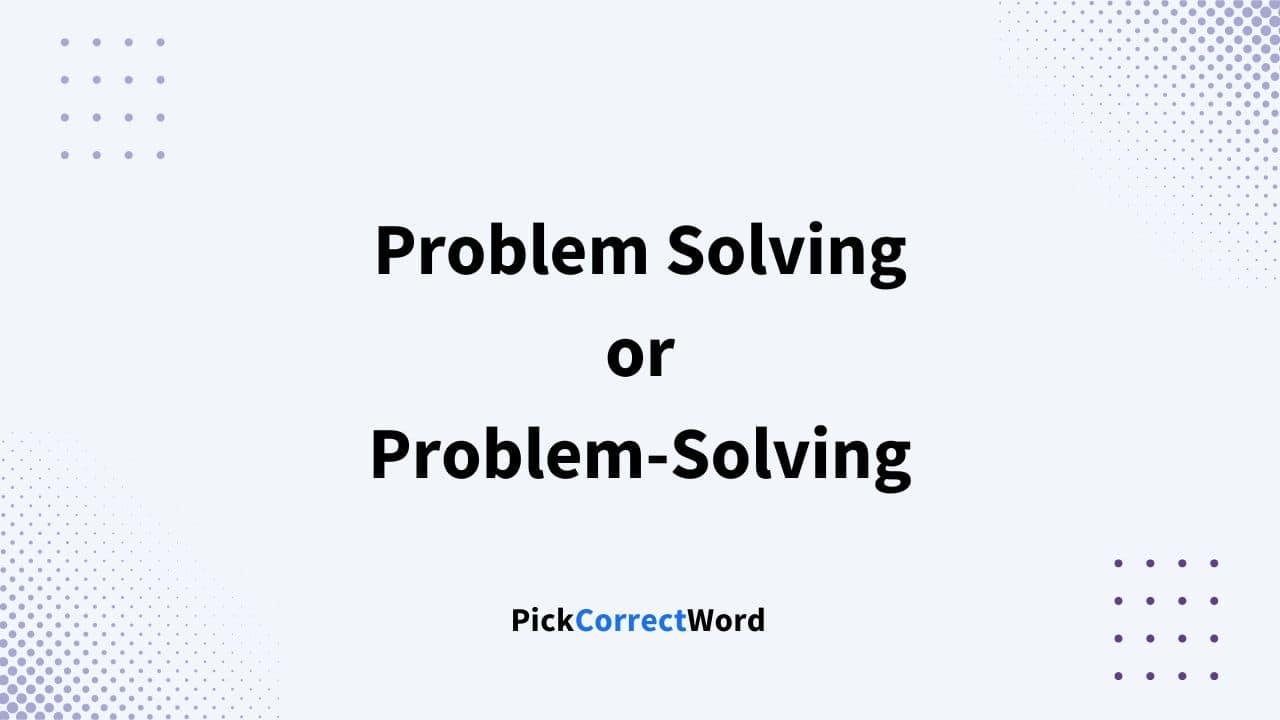When you’re facing a difficult situation, you often hear advice that you should do some “problem solving”. This is just a way of saying you need to figure out how to fix the issues you’re dealing with.
But you might be wondering, should you write it as problem solving or problem-solving? Both ways are correct. They just work better in different situations.
You can use “problem solving” when talking about the general skill of finding solutions.
“Problem-solving” with a hyphen usually refers to figuring things out in a specific situation or task.
Problem Solving or Problem-Solving? Which is Correct?
Both “problem solving” and “problem-solving” are correct, but their use depends on the role they play in a sentence. The difference boils down to whether you’re using the term as a noun or as an adjective with a hyphen.
Problem solving is generally used as a noun to refer to the process of finding solutions to difficult or complex issues.
Problem-solving, with a hyphen, functions as an adjective and describes a noun that relates to the process of solving problems.
For example:
- As a noun: You show great skill in problem solving when you tackle complex puzzles.
- As an adjective: Your problem-solving abilities are outstanding when dealing with customer complaints.
Problem Solving: Meaning And Usage
“Problem solving” is about your ability to look at situations, find the obstacles, and come up with effective solutions.
When you use “problem-solving” as a noun or an adjective, you usually put a hyphen in between. But, when it’s used as a verb or a gerund—which is a verb acting as a noun—the two words are separate
For example, in the sentence: “Solving problems is part of your job”, the word “solving” is a gerund that describes the action, and “problems” is the thing that’s being acted on.
“Problem Solving” without the hyphen, is used to describe the general concept or activity, such as in “Problem solving is an important skill in all areas of life.”
Problem-Solving: Meaning And Usage
“Problem-solving”, when written with a hyphen, is used as a combined adjective to describe something else, like in “problem-solving skills.” It gives more information about the ability or quality of the person or thing you’re talking about.
In a sentence, “problem-solving” works as if it’s just one word. The hyphen shows that “problem” and “solving” together make up a single meaning that describes another word.
For example, in the sentence: “Her problem-solving skills are impressive,” the term “problem-solving” is used as an adjective to describe the word “skills.” Here, “problem-solving” tells us what type of skills we’re talking about.
You’ll often see “problem-solving” used in job situations, where it’s a good trait to have in potential employees.
Examples of Using “Problem Solving” in a Sentence
“He has a unique approach to problem solving.”
“She excels in problem solving under pressure.”
“Problem solving is an essential skill in this line of work.”
“His talent for problem solving is impressive.”
“We need more training in problem solving.”
“This game is great for developing problem solving.”
Examples of using “Problem-Solving” in a sentence
“I admire your problem-solving skills.”
“She showed excellent problem-solving abilities in that situation.”
“This job requires strong problem-solving capabilities.”
“He has a problem-solving mindset.”
“They offer a course in problem-solving techniques.”
“Her problem-solving approach was commendable.”
Frequently Asked Questions
When is it appropriate to use a hyphen in ‘problem-solving’ on a resume?
In your resume, you should use a hyphen in ‘problem-solving’ when it functions as an adjective before a noun, such as in “problem-solving skills.” This indicates that the two words together describe a specific ability.
Are ‘problem solving’ and ‘problem-solving’ used differently in American and British English?
No, ‘problem solving’ and ‘problem-solving’ follow the same rules in both American and British English. A hyphen is used when the phrase acts as an adjective, and no hyphen is used when it is a noun.
Is the term ‘decision-making’ supposed to be hyphenated similar to ‘problem-solving’?
Yes, ‘decision-making’ should be hyphenated when it serves as an adjective, similar to ‘problem-solving.’ For example, you might write about “a decision-making process.” When used as a noun, the hyphen is typically dropped: “The seminar focuses on decision making.”


